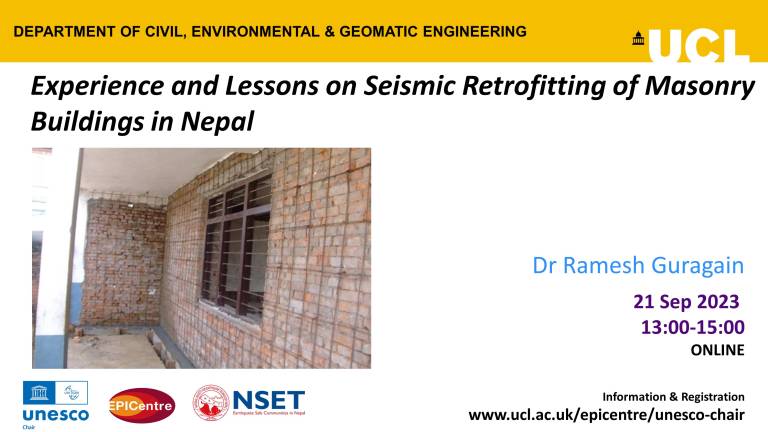Experience and Lessons on Seismic Retrofitting of Masonry Buildings in Nepal
7 August 2023
This talk focuses on sharing experiences and lessons on seismic retrofitting of masonry buildings in Nepal. Successes and challenges in raising awareness, capacity building, financial mobilization, and institutionalization of the concept are main areas of discussion.

The seismic retrofitting of masonry buildings, mainly schools, started in 1990s in Nepal. Technical feasibility, financial affordability, sustainability, cultural acceptability, and replicability were some of the initial challenges. National Society for Earthquake Technology-Nepal (NSET) initiated the concept despite those challenges and about 300 school buildings were retrofitted before Gorkha Earthquake 2015. All the retrofitted schools sustained no damage during Gorkha earthquake. While thousands of non-retrofitted schools in the same location collapsed. Now, hundreds of school buildings are being retrofitted as a part of government program. This talk focuses on sharing experiences and lessons on seismic retrofitting of masonry buildings in Nepal. Successes and challenges in terms of technology, awareness raising, capacity building, financial mobilization, and institutionalization of the concept are main areas of discussion. The talk will also cover the replication of the concept from schools to residential buildings, schools to other institutional buildings, masonry to RC buildings, urban to rural buildings, and Nepal to other countries. |
Presenters’ biography
Ramesh Guragain, PhD
National Society for Earthquake Technology Nepal (NSET-Nepal)

Dr. Ramesh Guragain, working as a Deputy Executive Director at National Society for Earthquake Technology-Nepal (NSET) has PhD on Earthquake Engineering from The University of Tokyo. He joined NSET in 2000 and working in the field of earthquake risk management since then. The countries of working experience are mainly in Nepal, India, Pakistan, Bangladesh, Bhutan, Iran, Afghanistan and shortly in other countries in South/South-East Asia. Earthquake risk assessment of buildings, infrastructures and urban/rural settlements in Nepal and the south Asian region is one of the major program areas that Ramesh is leading from NSET in recent years. Seismic vulnerability assessment and retrofitting of public-school buildings in Nepal; assessment 20 major hospitals in Nepal; seismic vulnerability assessment of more than 100 office and private residences in Nepal; development of fragility functions for non-engineered buildings in Nepal and Bangladesh are some of the major activities related to this area that NSET implemented in his leadership. He has also led a team of professionals at NSET for development of several training curricula and provided trainings to different target audiences.
Links
 Close
Close

